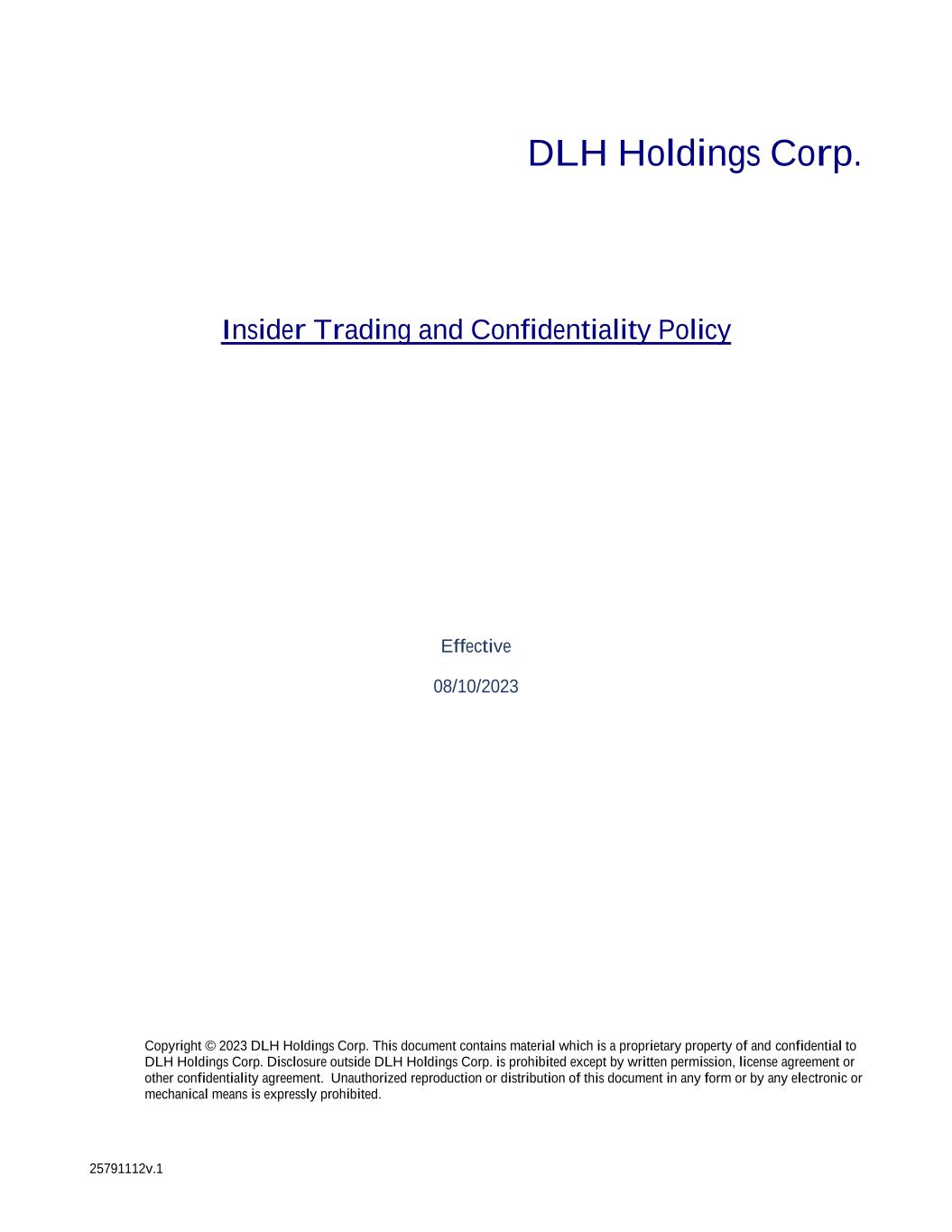
25791112v.1 DLH Holdings Corp. Insider Trading and Confidentiality Policy Effective 08/10/2023 Copyright © 2023 DLH Holdings Corp. This document contains material which is a proprietary property of and confidential to DLH Holdings Corp. Disclosure outside DLH Holdings Corp. is prohibited except by written permission, license agreement or other confidentiality agreement. Unauthorized reproduction or distribution of this document in any form or by any electronic or mechanical means is expressly prohibited.

2 25791112v.1 Table of Contents 1. Overview ............................................................................................................................................ 3 2. Applicability ...................................................................................................................................... 3 3. Improper Insider Trading ............................................................................................................... 4 a. General Prohibitions .................................................................................................................. 4 b. What is insider trading? ............................................................................................................. 4 c. Who is an insider? ...................................................................................................................... 5 d. What is material, non-public information? .............................................................................. 5 e. When Is Information Deemed Public? ..................................................................................... 6 4. Policies Regarding Transactions in the Company’s Securities .................................................... 6 a. Prohibitions and Requirements for All Employees and Others Subject to this Policy…….7 b. Prohibitions and Procedures for Section 16 Reporting Persons and Designated Individuals………………………………………………………………………………………7 c. Exceptions to the Prohibitions on Trading……………………………….……………..……9 5. Policy Regarding Hedging and Pledging of Company Securities .............................................. 10 a. Introduction………………………….……………………..…………………………………10 b. Objectives…………………………………………………..…………………………………15 c. Applicability………………………………………………..…………………………… ……151 d. Policy………………………………………………………..…………………………………11 6. Application of Policy After Employment Termination ............................................................... 12 7. Potential Criminal and Civil Liability and/or Disciplinary Action ............................................ 13 8. Penalties for Violating This Policy ................................................................................................ 13 9. Policies Regarding the Use, Disclosure and Protection of Material, Nonpublic Information . 13 a. Confidentiality........................................................................................................................... 13 b. Inadvertent Disclosure of Material, Nonpublic Information……………………………....15 c. Responding to Inquiries from the Press and Others ............................................................. 15 10. General Terms ................................................................................................................................ 15 a. Insider Trading Compliance…………………………………………………………………15 b. Certification………………………………………………..…………………………………15

3 25791112v.1 1. Overview All DLH Holdings Corp. (together with its subsidiaries, “DLH” or “the Company”) personnel must be aware that the securities laws impose important restrictions on “insiders” of companies with respect to their securities transactions. In appropriate cases, “insider” status can extend to persons who are not DLH employees, but who are retained by DLH for a particular project or on a continuing basis. This Insider Trading and Confidentiality Policy (this “Policy”) provides guidelines with respect to transactions involving the Company’s securities and the handling of confidential information about the Company and third parties with which the Company does business. The principal restriction on insiders is that insiders may not trade in the Company’s securities (the “Company Securities”) on the basis of material information known to them but not to the public or “tip” others concerning such information. Violations of these restrictions can carry criminal as well as civil penalties. In light of these restrictions, and in order to avoid even the appearance of impropriety, DLH personnel may not trade in securities of DLH or any other company about which they possess material, non-public information until such information becomes public. The guidelines set forth in this Policy are designed to protect you from violating this Policy. All DLH personnel should be continually mindful of the necessity of maintaining the confidentiality of information as well as the problems of insider trading. This Policy reflects DLH’s long-standing commitment to maintain compliance with the securities laws. Because the securities laws are comprehensive, far-reaching and constantly evolving, the text of this Policy cannot possibly deal with all of the considerations that may be applicable to securities transactions. If you have a specific question, you should contact Victor J. DiGioia, Esq., DLH’s Governance Officer (the “Governance Officer”) and abstain from the conduct in question until you have been informed that the conduct is permissible. 2. Applicability This Policy applies to all DLH officers and employees, all members of the Company’s Board of Directors, and any consultants and contractors of the Company, as well as (i) “family members” of such persons and (ii) entities, including trusts and corporations, over which such persons have or share voting or investment control, or otherwise have influence (“Controlled Entities”). For purposes of this Policy, the term “Family Members” means (x) any family member who resides with you (including a spouse, domestic partner, a child, a child away at college, stepchildren, grandchildren, parents, stepparents, grandparents, siblings and in-laws), (y) anyone else who lives in your household (other than household employees), and (z) any family members who do not live in your household but whose transactions in Company securities are directed by you or are subject to your influence or control, such as parents or children who consult with you before they trade in Company securities. Accordingly, all references in this policy to DLH “personnel” include all of these people and entities as well. DLH recognizes such broad coverage might not be appropriate in all cases. Any such instances should be discussed promptly with DLH’s Governance Officer.

4 25791112v.1 3. Improper Insider Trading While DLH policy prohibits all misuse of confidential information obtained by DLH personnel in connection with their employment by or relationship with the Company, including all securities trading based on such information, certain trading activities also violate the law. Because of the severity of the penalties provided by law and the potential for damage to DLH’s name and business reputation as a result of such unlawful trading, these legal prohibitions are summarized below. a. General Prohibitions DLH has a long-standing commitment to comply with federal, state and applicable foreign securities laws and regulations. In the course of business operations, personnel may become aware of material, non-public information. United States securities laws and the laws of certain foreign countries (as well as this Policy) prohibit persons from trading securities on the basis of material, non-public information or providing such information to others who trade. The law requires that an insider who is in possession of material, non-public information must either: (a) abstain from (i) trading in securities (including but not limited to equity securities, debt securities, and puts, calls, options, etc.) on the basis of material information that has not been disclosed to the public; (ii) recommending the purchase or sale of any Company Securities; (iii) disclosing such information to another person – a “tippee” – who uses it for trading purposes regardless of whether the “tippee” is related to the insider or is an entity (for example, a trust) in which the insider has an interest; (iv) assisting anyone engaged in the above activities; or (b) disclose it to the investing public. In light of DLH’s policy designating specific spokespersons responsible for communications with the investing public, this “abstain or disclose” rule established by law translates into the corporate policy that employees who are in possession of material, non-public information must abstain from trading on the basis of that information or disclosing the information to a “tippee.” Only authorized officers of the Company are permitted to decide the timing and content of public disclosures regarding the Company and Company personnel may not trade or “tip” until public disclosure has been made and adequate time has passed to assure broad dissemination of the information. The fact that an insider who possesses material inside information may have relied on factors other than the inside information in purchasing or selling securities will not absolve him or her from liability. If the insider is in possession of such information, he or she must refrain from any transaction in DLH’s securities. It is no excuse that the insider considered him- or herself under a duty (for example, as a trustee of a trust) to trade or that he or she did not intend to defraud anyone. As a result, DLH personnel should not enter into any relationship (such as that of a trustee) that might subject them to such a duty to trade. b. What is insider trading? The prohibition against such trading generally is understood to prohibit (1) trading on the basis of material, non-public information, (2) disclosing or “tipping” material, non-public information to others or recommending the purchase or sale of securities on the basis of such information or (3) assisting someone who is engaged in any of the above activities. Additionally, the prohibition on insider trading
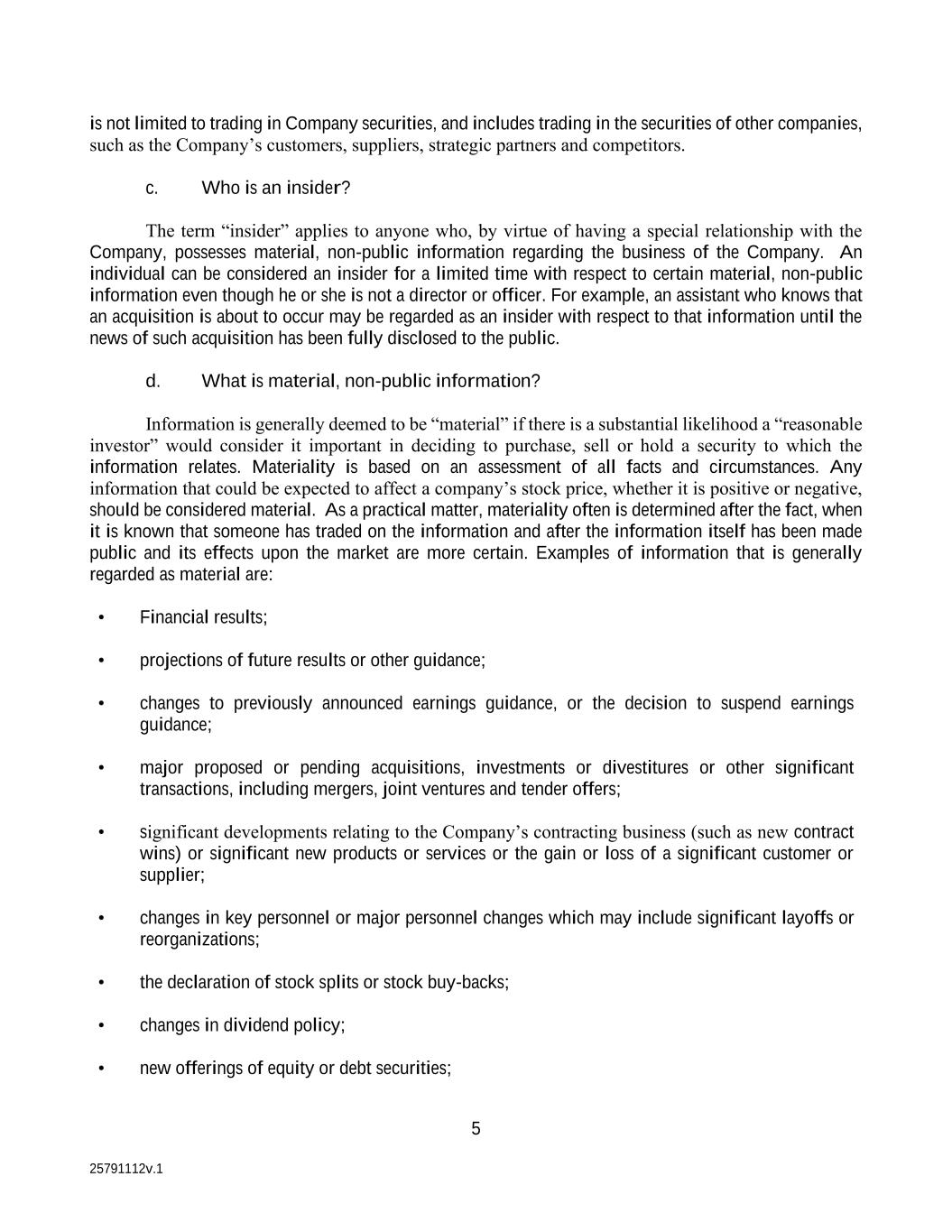
5 25791112v.1 is not limited to trading in Company securities, and includes trading in the securities of other companies, such as the Company’s customers, suppliers, strategic partners and competitors. c. Who is an insider? The term “insider” applies to anyone who, by virtue of having a special relationship with the Company, possesses material, non-public information regarding the business of the Company. An individual can be considered an insider for a limited time with respect to certain material, non-public information even though he or she is not a director or officer. For example, an assistant who knows that an acquisition is about to occur may be regarded as an insider with respect to that information until the news of such acquisition has been fully disclosed to the public. d. What is material, non-public information? Information is generally deemed to be “material” if there is a substantial likelihood a “reasonable investor” would consider it important in deciding to purchase, sell or hold a security to which the information relates. Materiality is based on an assessment of all facts and circumstances. Any information that could be expected to affect a company’s stock price, whether it is positive or negative, should be considered material. As a practical matter, materiality often is determined after the fact, when it is known that someone has traded on the information and after the information itself has been made public and its effects upon the market are more certain. Examples of information that is generally regarded as material are: • Financial results; • projections of future results or other guidance; • changes to previously announced earnings guidance, or the decision to suspend earnings guidance; • major proposed or pending acquisitions, investments or divestitures or other significant transactions, including mergers, joint ventures and tender offers; • significant developments relating to the Company’s contracting business (such as new contract wins) or significant new products or services or the gain or loss of a significant customer or supplier; • changes in key personnel or major personnel changes which may include significant layoffs or reorganizations; • the declaration of stock splits or stock buy-backs; • changes in dividend policy; • new offerings of equity or debt securities;

6 25791112v.1 • significant developments in pending or threatened significant litigation; • significant actual or potential cybersecurity risks, incidents or events that affect the Company or third-party providers that support the Company’s business operations, including computer system or network compromises, viruses or other destructive software and data breach incidents that may disclose personal, business or other confidential information; • events that may result in the creation of a significant reserve or write-off or other significant adjustments to the financial statements; • pending or threatened significant litigation or inquiry by a governmental or regulatory authority; and • any other facts, either positive or negative, which might cause the Company’s financial results to be substantially affected. If you have any questions regarding whether information you possess is material or not, you should contact the Compliance Officer. A good general rule of thumb: When in doubt, do not trade. e. When Is Information Deemed Public? A person with material, non-public information may trade only when he or she is certain that an official announcement of the material information has been sufficiently publicized so that the public has had the opportunity to evaluate the information. “Non-public” information is any information that has not been previously disclosed and is not otherwise available to the general investing public. While this includes information about the Company, it may also include anything learned about DLH or its securities as a result of a special relationship with DLH and information about other companies and their securities learned as a result of a special relationship with DLH. Information should be considered “non- public” until after two full “Trading Days” (as defined below) after such information has been disseminated widely to the general public through press releases, news reports, publication in a widely available newspaper, SEC filings or other comparable means. For purposes of this Policy, a “Trading Day” shall mean a day on which the stock market (i.e., Nasdaq) is open for trading. DLH personnel may not attempt to “beat the market” by trading simultaneously with, or shortly after, the official release of material information. Accordingly, this Policy requires that all DLH personnel wait two (2) full trading days after the public disclosure of “non-public” information before trading in DLH securities. Depending on the particular circumstances, the Company may determine that a longer or shorter period should apply to the release of specific material non-public information. 4. Policies Regarding Transactions in the Company’s Securities The following policies apply to all transactions (including gifts), direct or indirect, in all of the Company’s Securities, including, but not limited to, the Company’s Common Stock (including those shares of common stock that may be held in any Company 401(k) retirement savings plan, pension plan, retirement plan, other similar plan or any such similar plan that the Company may adopt in the future), and derivative securities (including stock options, put or call options and other similar securities). It is very important that you understand and follow these rules. If you violate them, you may be subject to

7 25791112v.1 disciplinary action by the Company (including termination of your employment for cause). You could also be in violation of applicable securities laws (and subject to civil and criminal penalties, including fines and imprisonment). Note that it is your individual responsibility to comply with the laws against insider trading. This Policy is intended to assist you in complying with these laws, but you must always exercise appropriate judgment in connection with any trade in the Company’s stock. The responsibility for determining whether you are in possession of material non-public information rests with you, and any action on the part of the Company, any of its employees or directors pursuant to this Policy (or otherwise) does not in any way constitute legal advice or insulate you from liability under applicable securities laws. The terms “material information,” “nonpublic information,” “Black-Out Period” and “Trading Window” are defined elsewhere in this Policy. a. Prohibitions and Requirements for All Employees and Others Subject to this Policy: 1. No Trading on Material, Nonpublic Information. No employee or other person subject to this Policy who possesses any material, non-public information concerning the Company or a third party with whom the Company does business shall engage in any transaction in the Company’s or such third party’s securities, including any offer to purchase or sell, during any period commencing with the date that he or she obtains such material, non-public information and ending after two (2) Trading Days following the date of public disclosure of that information. After termination of employment, any employee who is in possession of material, non-public information is prohibited from trading in Company securities until that information has become public or is no longer material. 2. No Tipping. No employee or other person subject to this Policy shall disclose (“tip”) material, non-public information to any other person where such information may be used by such person to his or her benefit by trading in the securities of the company to which such information relates, nor shall an employee make any recommendations or express any opinions as to trading in Company Securities to any other person. 3. No Speculative Transactions involving the Company’s Stock. Don’t engage in any transactions that suggest you are speculating in DLH’s stock (that is, that you are trying to profit in short-term movements, either increases or decreases, in the stock price). You may not engage in any “short” sale, “sale against the box” or any equivalent transaction involving the Company’s stock (or the stock of any of DLH’s business partners in any of the situations described above). A “short” sale involves selling shares that you do not own at a specified price with the expectation that the price will go down so you can buy the shares at a lower price before you have to deliver them. 4. Compliance with Hedging Policies. DLH personnel shall comply at all times with the Company’s policies on hedging activities involving Company Securities. These policies are set forth in Section 5 below. b. Prohibitions and Procedures for Section 16 Reporting Persons and Designated Individuals:
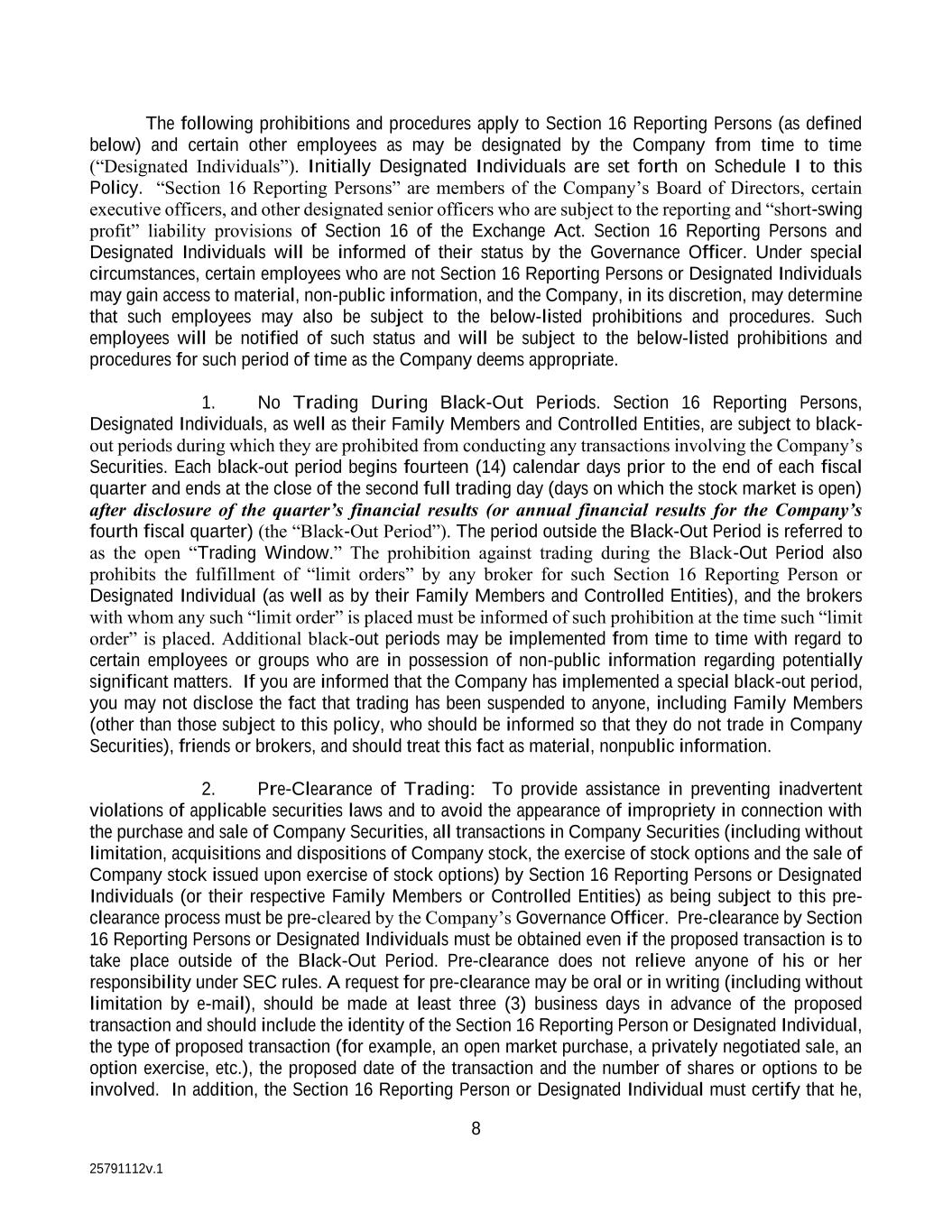
8 25791112v.1 The following prohibitions and procedures apply to Section 16 Reporting Persons (as defined below) and certain other employees as may be designated by the Company from time to time (“Designated Individuals”). Initially Designated Individuals are set forth on Schedule I to this Policy. “Section 16 Reporting Persons” are members of the Company’s Board of Directors, certain executive officers, and other designated senior officers who are subject to the reporting and “short-swing profit” liability provisions of Section 16 of the Exchange Act. Section 16 Reporting Persons and Designated Individuals will be informed of their status by the Governance Officer. Under special circumstances, certain employees who are not Section 16 Reporting Persons or Designated Individuals may gain access to material, non-public information, and the Company, in its discretion, may determine that such employees may also be subject to the below-listed prohibitions and procedures. Such employees will be notified of such status and will be subject to the below-listed prohibitions and procedures for such period of time as the Company deems appropriate. 1. No Trading During Black-Out Periods. Section 16 Reporting Persons, Designated Individuals, as well as their Family Members and Controlled Entities, are subject to black- out periods during which they are prohibited from conducting any transactions involving the Company’s Securities. Each black-out period begins fourteen (14) calendar days prior to the end of each fiscal quarter and ends at the close of the second full trading day (days on which the stock market is open) after disclosure of the quarter’s financial results (or annual financial results for the Company’s fourth fiscal quarter) (the “Black-Out Period”). The period outside the Black-Out Period is referred to as the open “Trading Window.” The prohibition against trading during the Black-Out Period also prohibits the fulfillment of “limit orders” by any broker for such Section 16 Reporting Person or Designated Individual (as well as by their Family Members and Controlled Entities), and the brokers with whom any such “limit order” is placed must be informed of such prohibition at the time such “limit order” is placed. Additional black-out periods may be implemented from time to time with regard to certain employees or groups who are in possession of non-public information regarding potentially significant matters. If you are informed that the Company has implemented a special black-out period, you may not disclose the fact that trading has been suspended to anyone, including Family Members (other than those subject to this policy, who should be informed so that they do not trade in Company Securities), friends or brokers, and should treat this fact as material, nonpublic information. 2. Pre-Clearance of Trading: To provide assistance in preventing inadvertent violations of applicable securities laws and to avoid the appearance of impropriety in connection with the purchase and sale of Company Securities, all transactions in Company Securities (including without limitation, acquisitions and dispositions of Company stock, the exercise of stock options and the sale of Company stock issued upon exercise of stock options) by Section 16 Reporting Persons or Designated Individuals (or their respective Family Members or Controlled Entities) as being subject to this pre- clearance process must be pre-cleared by the Company’s Governance Officer. Pre-clearance by Section 16 Reporting Persons or Designated Individuals must be obtained even if the proposed transaction is to take place outside of the Black-Out Period. Pre-clearance does not relieve anyone of his or her responsibility under SEC rules. A request for pre-clearance may be oral or in writing (including without limitation by e-mail), should be made at least three (3) business days in advance of the proposed transaction and should include the identity of the Section 16 Reporting Person or Designated Individual, the type of proposed transaction (for example, an open market purchase, a privately negotiated sale, an option exercise, etc.), the proposed date of the transaction and the number of shares or options to be involved. In addition, the Section 16 Reporting Person or Designated Individual must certify that he,
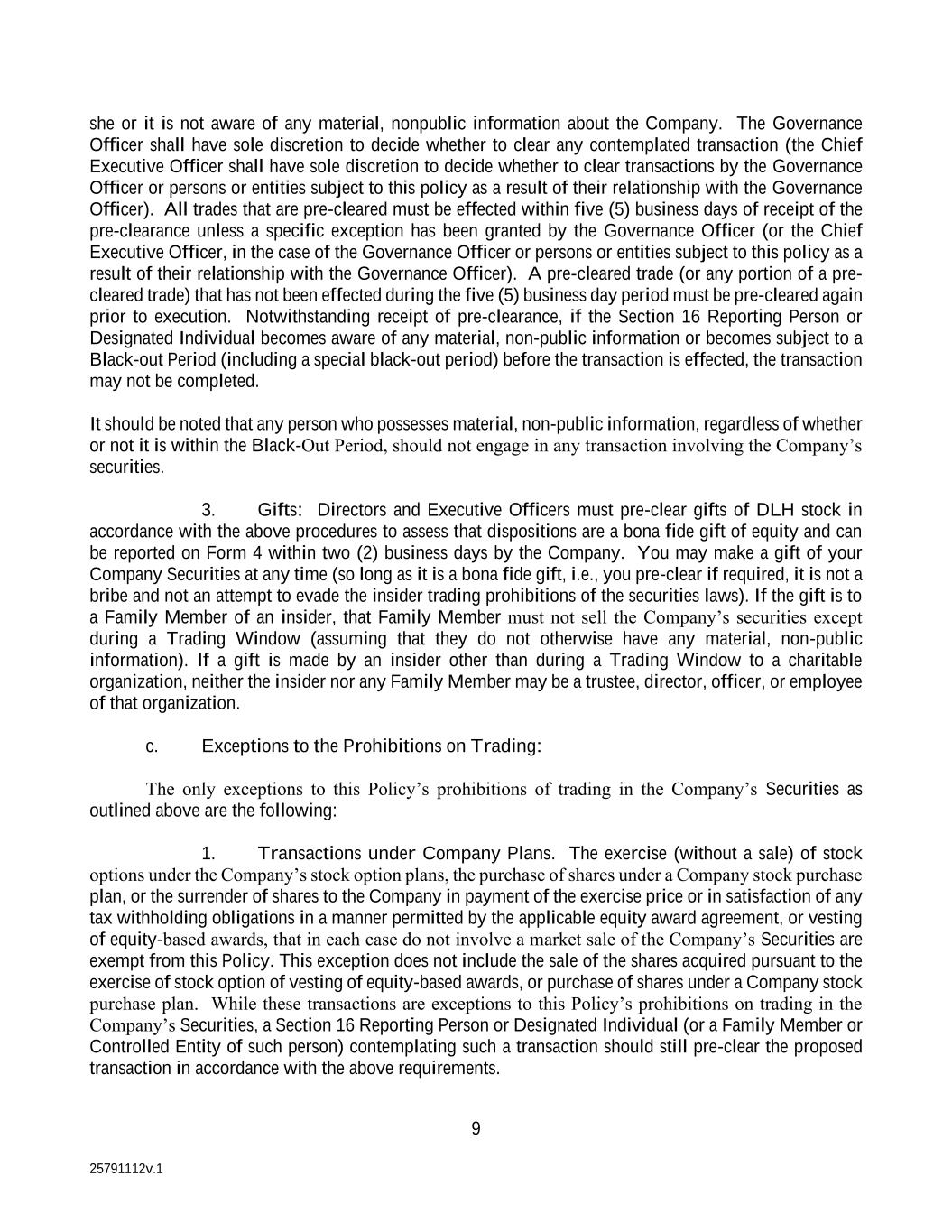
9 25791112v.1 she or it is not aware of any material, nonpublic information about the Company. The Governance Officer shall have sole discretion to decide whether to clear any contemplated transaction (the Chief Executive Officer shall have sole discretion to decide whether to clear transactions by the Governance Officer or persons or entities subject to this policy as a result of their relationship with the Governance Officer). All trades that are pre-cleared must be effected within five (5) business days of receipt of the pre-clearance unless a specific exception has been granted by the Governance Officer (or the Chief Executive Officer, in the case of the Governance Officer or persons or entities subject to this policy as a result of their relationship with the Governance Officer). A pre-cleared trade (or any portion of a pre- cleared trade) that has not been effected during the five (5) business day period must be pre-cleared again prior to execution. Notwithstanding receipt of pre-clearance, if the Section 16 Reporting Person or Designated Individual becomes aware of any material, non-public information or becomes subject to a Black-out Period (including a special black-out period) before the transaction is effected, the transaction may not be completed. It should be noted that any person who possesses material, non-public information, regardless of whether or not it is within the Black-Out Period, should not engage in any transaction involving the Company’s securities. 3. Gifts: Directors and Executive Officers must pre-clear gifts of DLH stock in accordance with the above procedures to assess that dispositions are a bona fide gift of equity and can be reported on Form 4 within two (2) business days by the Company. You may make a gift of your Company Securities at any time (so long as it is a bona fide gift, i.e., you pre-clear if required, it is not a bribe and not an attempt to evade the insider trading prohibitions of the securities laws). If the gift is to a Family Member of an insider, that Family Member must not sell the Company’s securities except during a Trading Window (assuming that they do not otherwise have any material, non-public information). If a gift is made by an insider other than during a Trading Window to a charitable organization, neither the insider nor any Family Member may be a trustee, director, officer, or employee of that organization. c. Exceptions to the Prohibitions on Trading: The only exceptions to this Policy’s prohibitions of trading in the Company’s Securities as outlined above are the following: 1. Transactions under Company Plans. The exercise (without a sale) of stock options under the Company’s stock option plans, the purchase of shares under a Company stock purchase plan, or the surrender of shares to the Company in payment of the exercise price or in satisfaction of any tax withholding obligations in a manner permitted by the applicable equity award agreement, or vesting of equity-based awards, that in each case do not involve a market sale of the Company’s Securities are exempt from this Policy. This exception does not include the sale of the shares acquired pursuant to the exercise of stock option of vesting of equity-based awards, or purchase of shares under a Company stock purchase plan. While these transactions are exceptions to this Policy’s prohibitions on trading in the Company’s Securities, a Section 16 Reporting Person or Designated Individual (or a Family Member or Controlled Entity of such person) contemplating such a transaction should still pre-clear the proposed transaction in accordance with the above requirements.
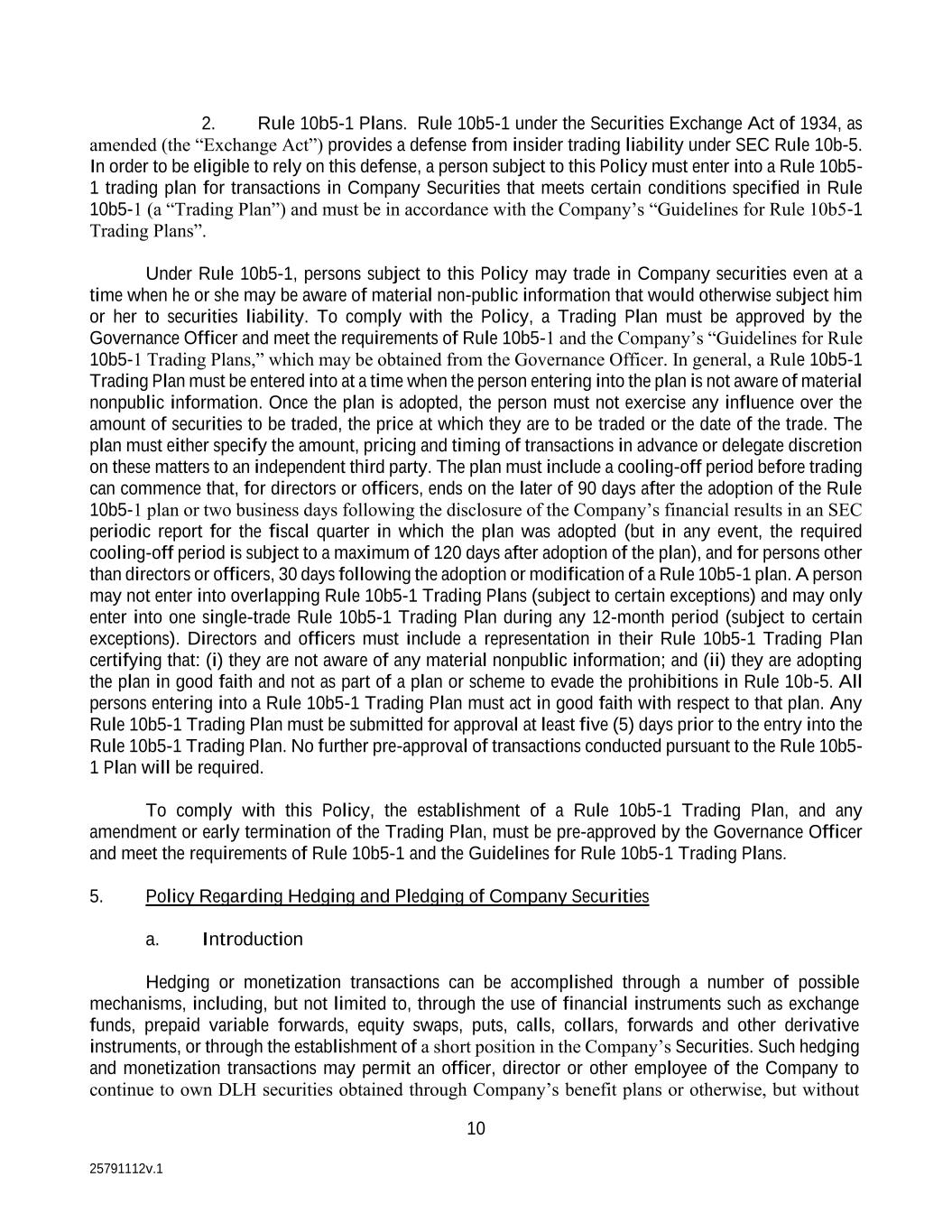
10 25791112v.1 2. Rule 10b5-1 Plans. Rule 10b5-1 under the Securities Exchange Act of 1934, as amended (the “Exchange Act”) provides a defense from insider trading liability under SEC Rule 10b-5. In order to be eligible to rely on this defense, a person subject to this Policy must enter into a Rule 10b5- 1 trading plan for transactions in Company Securities that meets certain conditions specified in Rule 10b5-1 (a “Trading Plan”) and must be in accordance with the Company’s “Guidelines for Rule 10b5-1 Trading Plans”. Under Rule 10b5-1, persons subject to this Policy may trade in Company securities even at a time when he or she may be aware of material non-public information that would otherwise subject him or her to securities liability. To comply with the Policy, a Trading Plan must be approved by the Governance Officer and meet the requirements of Rule 10b5-1 and the Company’s “Guidelines for Rule 10b5-1 Trading Plans,” which may be obtained from the Governance Officer. In general, a Rule 10b5-1 Trading Plan must be entered into at a time when the person entering into the plan is not aware of material nonpublic information. Once the plan is adopted, the person must not exercise any influence over the amount of securities to be traded, the price at which they are to be traded or the date of the trade. The plan must either specify the amount, pricing and timing of transactions in advance or delegate discretion on these matters to an independent third party. The plan must include a cooling-off period before trading can commence that, for directors or officers, ends on the later of 90 days after the adoption of the Rule 10b5-1 plan or two business days following the disclosure of the Company’s financial results in an SEC periodic report for the fiscal quarter in which the plan was adopted (but in any event, the required cooling-off period is subject to a maximum of 120 days after adoption of the plan), and for persons other than directors or officers, 30 days following the adoption or modification of a Rule 10b5-1 plan. A person may not enter into overlapping Rule 10b5-1 Trading Plans (subject to certain exceptions) and may only enter into one single-trade Rule 10b5-1 Trading Plan during any 12-month period (subject to certain exceptions). Directors and officers must include a representation in their Rule 10b5-1 Trading Plan certifying that: (i) they are not aware of any material nonpublic information; and (ii) they are adopting the plan in good faith and not as part of a plan or scheme to evade the prohibitions in Rule 10b-5. All persons entering into a Rule 10b5-1 Trading Plan must act in good faith with respect to that plan. Any Rule 10b5-1 Trading Plan must be submitted for approval at least five (5) days prior to the entry into the Rule 10b5-1 Trading Plan. No further pre-approval of transactions conducted pursuant to the Rule 10b5- 1 Plan will be required. To comply with this Policy, the establishment of a Rule 10b5-1 Trading Plan, and any amendment or early termination of the Trading Plan, must be pre-approved by the Governance Officer and meet the requirements of Rule 10b5-1 and the Guidelines for Rule 10b5-1 Trading Plans. 5. Policy Regarding Hedging and Pledging of Company Securities a. Introduction Hedging or monetization transactions can be accomplished through a number of possible mechanisms, including, but not limited to, through the use of financial instruments such as exchange funds, prepaid variable forwards, equity swaps, puts, calls, collars, forwards and other derivative instruments, or through the establishment of a short position in the Company’s Securities. Such hedging and monetization transactions may permit an officer, director or other employee of the Company to continue to own DLH securities obtained through Company’s benefit plans or otherwise, but without

11 25791112v.1 the full risks and rewards of ownership. When that occurs, the director, officer or employee may no longer have the same objectives as the Company’s other stockholders. Moreover, certain short-term or speculative transactions in the Company’s Securities by officers, directors, and certain other employees create the potential for heightened legal risk and/or the appearance of improper or inappropriate conduct involving the Company’s Securities. b. Objectives The objectives of this policy regarding hedging and pledging activities (the “Hedging Policy”) are to: (1) prohibit the Company’s officers, directors, and key employees from directly or indirectly engaging in hedging or monetization transactions, through transactions in the Company’s Securities or through the use of financial instruments designed for such purpose; and (2) prohibit officers, directors, and key employees from engaging in short-term or speculative transactions in the Company’s Securities that could create heightened legal risk and/or the appearance of improper or inappropriate conduct by the Company’s officers, directors or key employees. c. Applicability This Hedging Policy applies to all of the Company’s officers, directors, and key employees. As used in this Section 5, the term “key employee” means a non-executive employee of the Company that holds a position at or above the level of Vice President or Senior Manager. The Board of Directors may determine whether this Hedging Policy should apply to other individuals, including consultants and contractors to the Company. d. Policy The Company’s officers, directors, and key employees may not engage in any hedging or monetization transactions with respect to the Company’s Securities, including, but not limited to, through the use of financial instruments such as exchange funds, prepaid variable forwards, equity swaps, puts, calls, collars, forwards and other derivative instruments, or through the establishment of a short position in the Company’s Securities. Further, the Company’s officers, directors, and key employees may not engage in the following in short-term or speculative transactions in the Company’s Securities that could create heightened legal risk and/or the appearance of improper or inappropriate conduct by the Company’s officers, directors, or key employees: • Short-Term Trading. Short-term trading of the Company’s Securities may be distracting to the person and may unduly focus the person on the Company’s short-term stock market performance, instead of the Company’s long-term business objectives. For these reasons, any officer, director or key employee of the Company who purchases the Company’s Securities in the open market may not sell any Company Securities of the same class during the six months following the purchase (or vice versa). • Short Sales. Short sales of the Company’s Securities (i.e., the sale of a security that the seller does not own) or “sales against the box” may evidence an expectation on the part
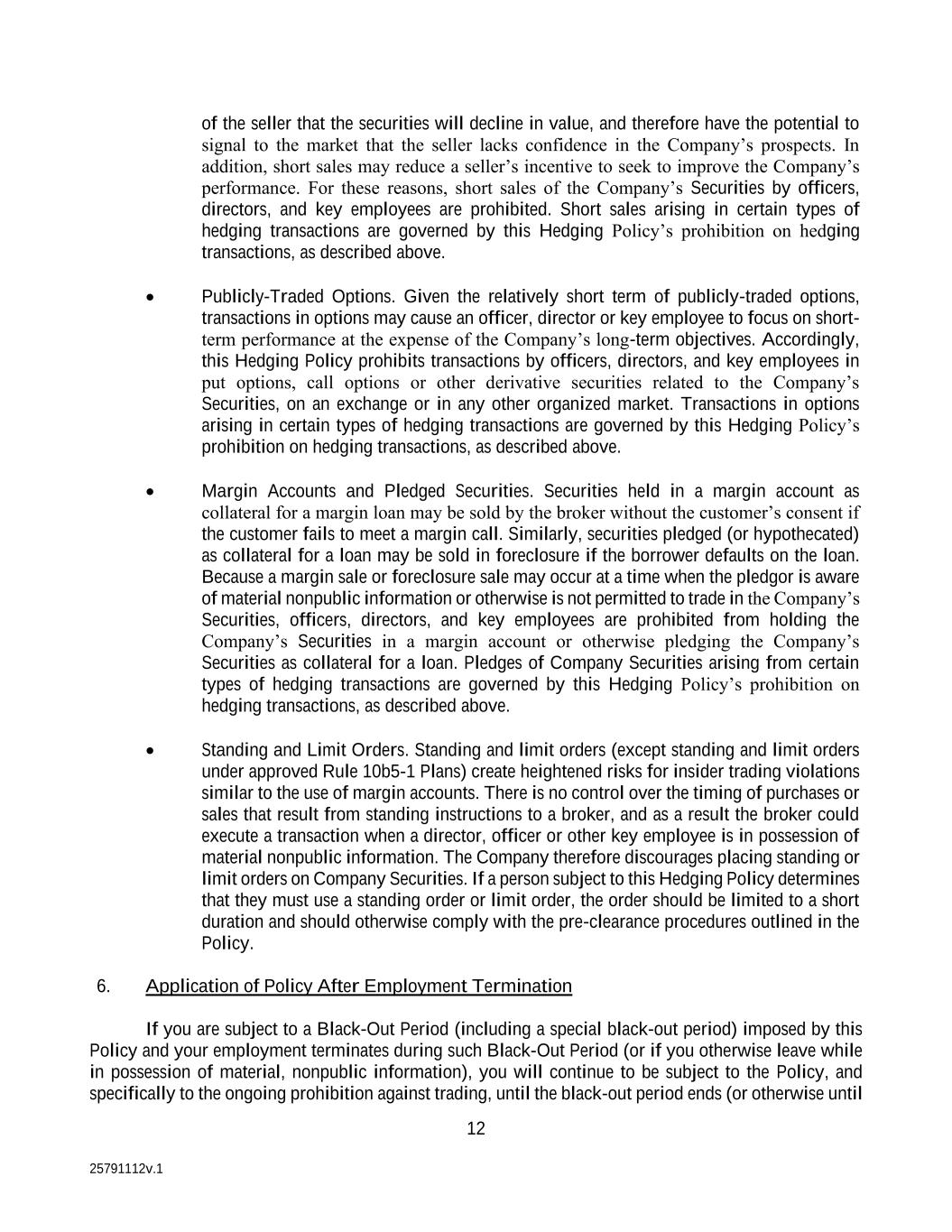
12 25791112v.1 of the seller that the securities will decline in value, and therefore have the potential to signal to the market that the seller lacks confidence in the Company’s prospects. In addition, short sales may reduce a seller’s incentive to seek to improve the Company’s performance. For these reasons, short sales of the Company’s Securities by officers, directors, and key employees are prohibited. Short sales arising in certain types of hedging transactions are governed by this Hedging Policy’s prohibition on hedging transactions, as described above. • Publicly-Traded Options. Given the relatively short term of publicly-traded options, transactions in options may cause an officer, director or key employee to focus on short- term performance at the expense of the Company’s long-term objectives. Accordingly, this Hedging Policy prohibits transactions by officers, directors, and key employees in put options, call options or other derivative securities related to the Company’s Securities, on an exchange or in any other organized market. Transactions in options arising in certain types of hedging transactions are governed by this Hedging Policy’s prohibition on hedging transactions, as described above. • Margin Accounts and Pledged Securities. Securities held in a margin account as collateral for a margin loan may be sold by the broker without the customer’s consent if the customer fails to meet a margin call. Similarly, securities pledged (or hypothecated) as collateral for a loan may be sold in foreclosure if the borrower defaults on the loan. Because a margin sale or foreclosure sale may occur at a time when the pledgor is aware of material nonpublic information or otherwise is not permitted to trade in the Company’s Securities, officers, directors, and key employees are prohibited from holding the Company’s Securities in a margin account or otherwise pledging the Company’s Securities as collateral for a loan. Pledges of Company Securities arising from certain types of hedging transactions are governed by this Hedging Policy’s prohibition on hedging transactions, as described above. • Standing and Limit Orders. Standing and limit orders (except standing and limit orders under approved Rule 10b5-1 Plans) create heightened risks for insider trading violations similar to the use of margin accounts. There is no control over the timing of purchases or sales that result from standing instructions to a broker, and as a result the broker could execute a transaction when a director, officer or other key employee is in possession of material nonpublic information. The Company therefore discourages placing standing or limit orders on Company Securities. If a person subject to this Hedging Policy determines that they must use a standing order or limit order, the order should be limited to a short duration and should otherwise comply with the pre-clearance procedures outlined in the Policy. 6. Application of Policy After Employment Termination If you are subject to a Black-Out Period (including a special black-out period) imposed by this Policy and your employment terminates during such Black-Out Period (or if you otherwise leave while in possession of material, nonpublic information), you will continue to be subject to the Policy, and specifically to the ongoing prohibition against trading, until the black-out period ends (or otherwise until
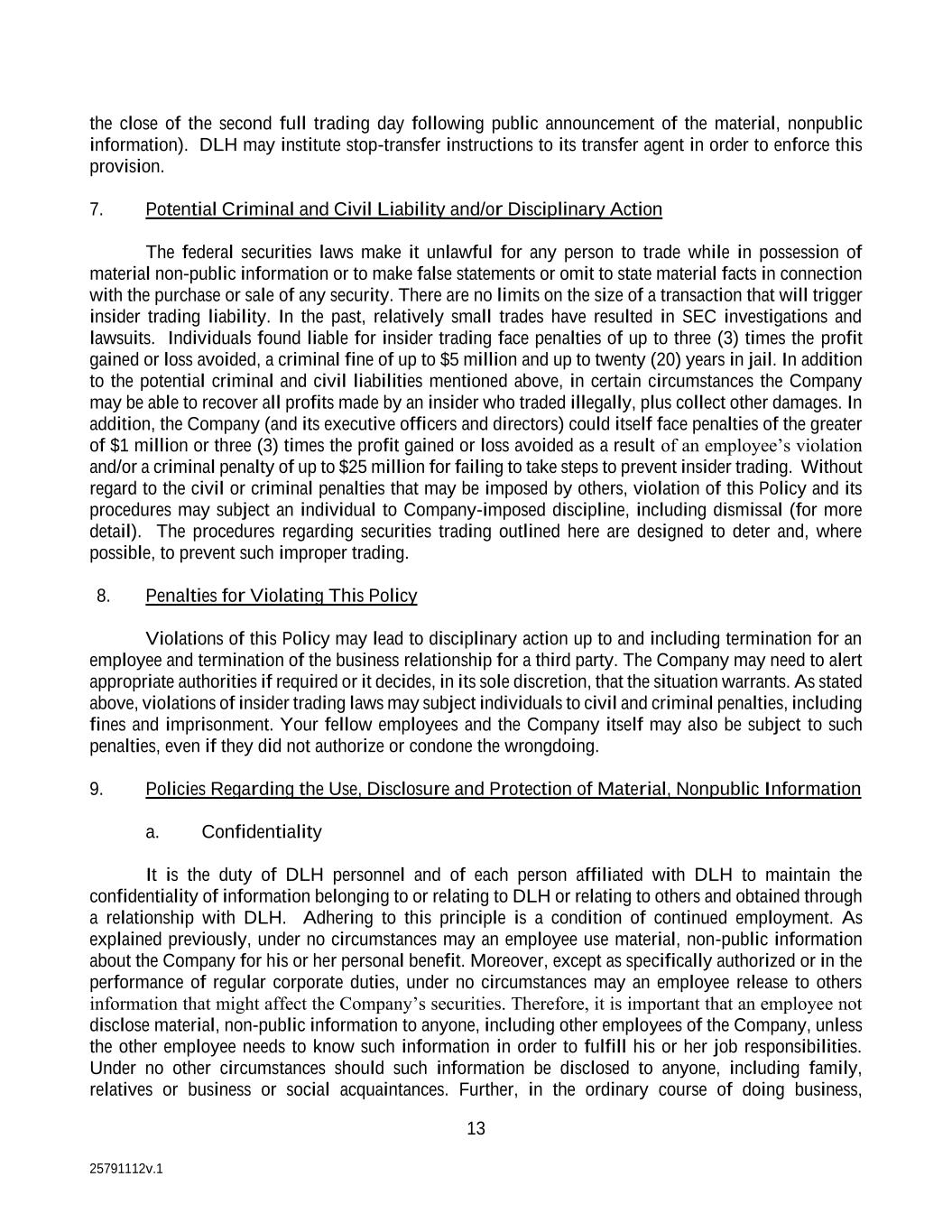
13 25791112v.1 the close of the second full trading day following public announcement of the material, nonpublic information). DLH may institute stop-transfer instructions to its transfer agent in order to enforce this provision. 7. Potential Criminal and Civil Liability and/or Disciplinary Action The federal securities laws make it unlawful for any person to trade while in possession of material non-public information or to make false statements or omit to state material facts in connection with the purchase or sale of any security. There are no limits on the size of a transaction that will trigger insider trading liability. In the past, relatively small trades have resulted in SEC investigations and lawsuits. Individuals found liable for insider trading face penalties of up to three (3) times the profit gained or loss avoided, a criminal fine of up to $5 million and up to twenty (20) years in jail. In addition to the potential criminal and civil liabilities mentioned above, in certain circumstances the Company may be able to recover all profits made by an insider who traded illegally, plus collect other damages. In addition, the Company (and its executive officers and directors) could itself face penalties of the greater of $1 million or three (3) times the profit gained or loss avoided as a result of an employee’s violation and/or a criminal penalty of up to $25 million for failing to take steps to prevent insider trading. Without regard to the civil or criminal penalties that may be imposed by others, violation of this Policy and its procedures may subject an individual to Company-imposed discipline, including dismissal (for more detail). The procedures regarding securities trading outlined here are designed to deter and, where possible, to prevent such improper trading. 8. Penalties for Violating This Policy Violations of this Policy may lead to disciplinary action up to and including termination for an employee and termination of the business relationship for a third party. The Company may need to alert appropriate authorities if required or it decides, in its sole discretion, that the situation warrants. As stated above, violations of insider trading laws may subject individuals to civil and criminal penalties, including fines and imprisonment. Your fellow employees and the Company itself may also be subject to such penalties, even if they did not authorize or condone the wrongdoing. 9. Policies Regarding the Use, Disclosure and Protection of Material, Nonpublic Information a. Confidentiality It is the duty of DLH personnel and of each person affiliated with DLH to maintain the confidentiality of information belonging to or relating to DLH or relating to others and obtained through a relationship with DLH. Adhering to this principle is a condition of continued employment. As explained previously, under no circumstances may an employee use material, non-public information about the Company for his or her personal benefit. Moreover, except as specifically authorized or in the performance of regular corporate duties, under no circumstances may an employee release to others information that might affect the Company’s securities. Therefore, it is important that an employee not disclose material, non-public information to anyone, including other employees of the Company, unless the other employee needs to know such information in order to fulfill his or her job responsibilities. Under no other circumstances should such information be disclosed to anyone, including family, relatives or business or social acquaintances. Further, in the ordinary course of doing business,

14 25791112v.1 employees may come into possession of material, non-public information with respect to other companies with whom the Company does business. An individual receiving material, non-public information in such a manner has the same duty not to disclose the information to others or to use that information in connection with securities transactions of such other company as such individual has with respect to material, non-public information about the Company. In maintaining the confidentiality of the information, the individual in possession of such information shall not affirm or deny statements made by others, either directly or through electronic means, if such affirmation or denial would result in the disclosure of material, non-public information. If an employee has any doubt about whether certain information is non-public or material, such doubt should be resolved in favor of not communicating such information or trading without discussing with the Governance Officer or raising with the Company’s counsel. Questions concerning what is or is not material, non-public information should also be directed to the Company’s Governance Officer. You should take every practicable step to preserve the confidentiality of information. For example: • Don’t discuss material information in elevators, hallways, restaurants, airplanes, taxi cabs or any place where you can be overheard. • Don’t gossip about confidential information. • Don’t read confidential documents in public places (this can include working on your laptop of mobile phones while traveling) or discard them where they can be retrieved by others. • Don’t carry confidential documents in elevators, hallways, etc. in an exposed manner • Beware of the carrying quality of conversations conducted on speaker telephones in offices, and the potential for eavesdropping on conversations conducted on cell phones, airplane telephones or marine radios. • Don’t leave confidential documents unattended in conference rooms and don’t leave confidential documents behind when the conference is over. • Cover confidential documents on your desk before you leave work or your hotel room, if you are traveling. • Be careful when giving out the whereabouts of personnel not in the office or revealing the presence of specific visitors to the office. The mere fact of a meeting or the destination of a trip may reveal something confidential. • Under no circumstances should personnel provide confidential DLH documents to third parties without the express consent of an authorized officer of the Company. This includes, but is not limited to, any confidential Company documents relating to DLH customers, competitors or suppliers. • Don’t participate in Internet “chat rooms” or internet platforms on which DLH is discussed or post information concerning DLH, its business or its securities on investor forums or other internet forums or platforms.
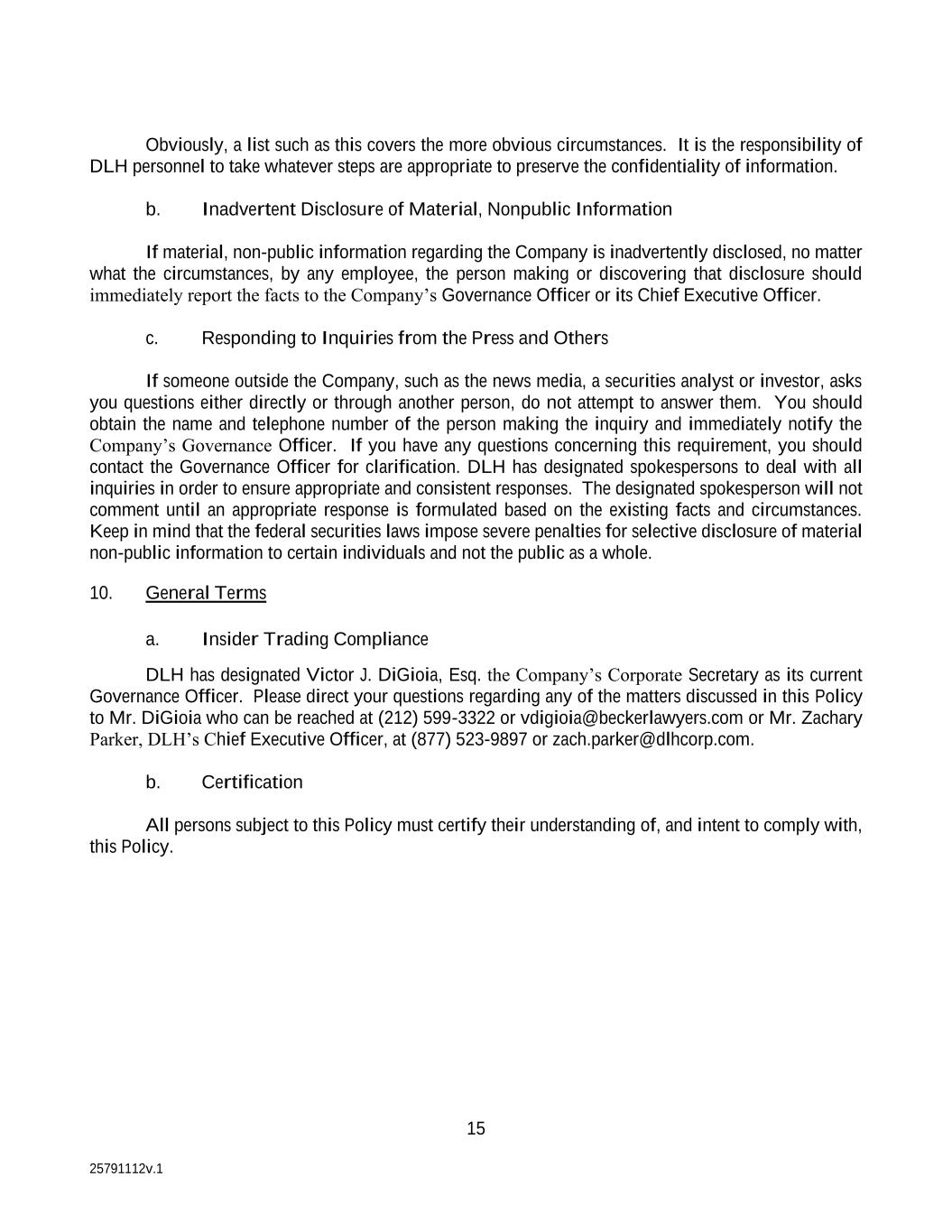
15 25791112v.1 Obviously, a list such as this covers the more obvious circumstances. It is the responsibility of DLH personnel to take whatever steps are appropriate to preserve the confidentiality of information. b. Inadvertent Disclosure of Material, Nonpublic Information If material, non-public information regarding the Company is inadvertently disclosed, no matter what the circumstances, by any employee, the person making or discovering that disclosure should immediately report the facts to the Company’s Governance Officer or its Chief Executive Officer. c. Responding to Inquiries from the Press and Others If someone outside the Company, such as the news media, a securities analyst or investor, asks you questions either directly or through another person, do not attempt to answer them. You should obtain the name and telephone number of the person making the inquiry and immediately notify the Company’s Governance Officer. If you have any questions concerning this requirement, you should contact the Governance Officer for clarification. DLH has designated spokespersons to deal with all inquiries in order to ensure appropriate and consistent responses. The designated spokesperson will not comment until an appropriate response is formulated based on the existing facts and circumstances. Keep in mind that the federal securities laws impose severe penalties for selective disclosure of material non-public information to certain individuals and not the public as a whole. 10. General Terms a. Insider Trading Compliance DLH has designated Victor J. DiGioia, Esq. the Company’s Corporate Secretary as its current Governance Officer. Please direct your questions regarding any of the matters discussed in this Policy to Mr. DiGioia who can be reached at (212) 599-3322 or vdigioia@beckerlawyers.com or Mr. Zachary Parker, DLH’s Chief Executive Officer, at (877) 523-9897 or zach.parker@dlhcorp.com. b. Certification All persons subject to this Policy must certify their understanding of, and intent to comply with, this Policy.
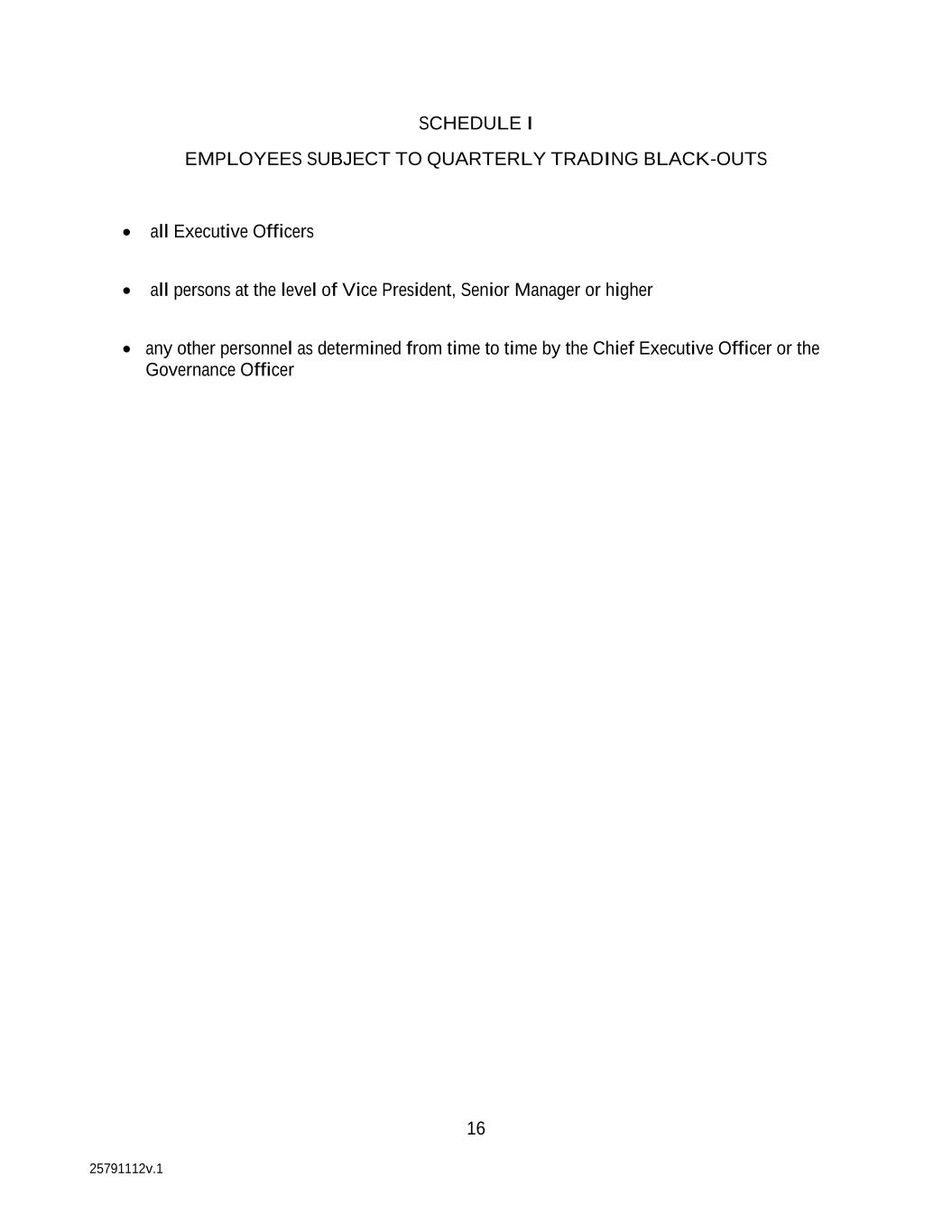
16 25791112v.1 SCHEDULE I EMPLOYEES SUBJECT TO QUARTERLY TRADING BLACK-OUTS • all Executive Officers • all persons at the level of Vice President, Senior Manager or higher • any other personnel as determined from time to time by the Chief Executive Officer or the Governance Officer
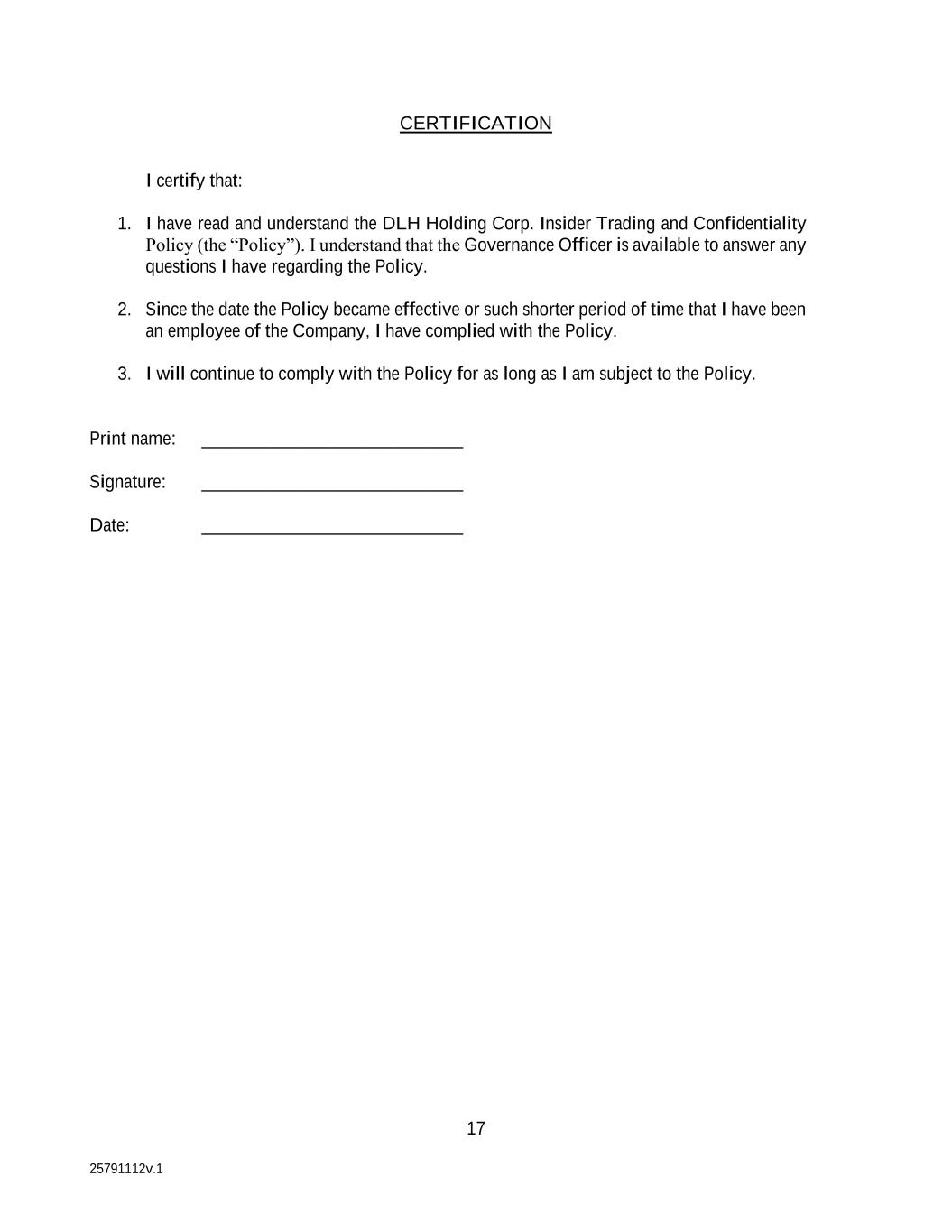
17 25791112v.1 CERTIFICATION I certify that: 1. I have read and understand the DLH Holding Corp. Insider Trading and Confidentiality Policy (the “Policy”). I understand that the Governance Officer is available to answer any questions I have regarding the Policy. 2. Since the date the Policy became effective or such shorter period of time that I have been an employee of the Company, I have complied with the Policy. 3. I will continue to comply with the Policy for as long as I am subject to the Policy. Print name: ____________________________ Signature: ____________________________ Date: ____________________________
















